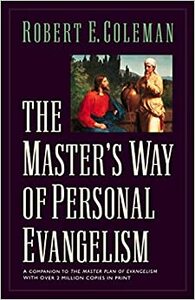Take a photo of a barcode or cover
informative
inspiring
reflective
medium-paced
Eight Guiding Principles of the Master's Plan
1. Selection
Men were His method.
Men were willing to learn.
Jesus saw in these men the potential for leadership.
He concentrated on a few. Kept the group small so he could effectively work with them.
The more concentrated the size of the group being taught, the more effective the instruction.
However, He did not neglect the masses.
Few seemed to understand His method.
Jesus needed people that could lead multitudes of people.
Devote to the few so the masses could be saved.
Multitudes can be won easily if they have competent leaders.
Society launches one crash program after another that appeals to the masses.
2. Association
He Stayed with them.
Naturally informal
Participated in the doctrine.
Foundation of follow up...inspect what you expect.
Those in the church were going to assume leadership.
3. Consecration
They had to be loyal.
Absolute submission to His sovereignty and obedience to Christ.
Consider the cost of submission.
4. Impartation
It was a life of giving. He was giving away what the Father had given Him.
5. Demonstration
He practiced prayer for them to observe.
Prayer was not a lesson that was forced on them but something that He continued for them to observe.
Kept the methods simple.
Not much would come of their lives unless they prayed.
Frequent use of Scripture.
Supreme focus was on soul winning; it all ways it was to be steered toward evangelism.
He didn't ask them to do anything that He would not do Himself.
6. Delegation
Not immediately evangelism for the disciples...patience is to be practiced before turning converts loose on the work.
Before turning them loose, good briefing instructions about the mission.
Expect hardship.
Be actual representatives of Christ.
Two by Two, Seventy, then larger group and each received essentially the same instructions.
7. Supervision
Sent out to work and then expected to come back to the group to share.
Stressed patience when there was a lack of results.
Practicing the work revealed to each person their own deficiencies which made them want to improve their methods.
8. Reproduction
Ever increasing circles of the method of training.
The Great Commission is to make disciples, and we should pray for "harvesters."
It is vitally important to perpetuate new leaders and not new followers.
Don't make the mistake of taking shortcuts to evangelizing the masses...train the leaders.
Epilogue and Closing Thoughts
Life has a plan.
Methods will vary.
Priority of people.
Begin with a few.
Stay and meet together.
Give them time.
Expect something from them.
Keep them going.
Help them carry their burdens.
1. Selection
Men were His method.
Men were willing to learn.
Jesus saw in these men the potential for leadership.
He concentrated on a few. Kept the group small so he could effectively work with them.
The more concentrated the size of the group being taught, the more effective the instruction.
However, He did not neglect the masses.
Few seemed to understand His method.
Jesus needed people that could lead multitudes of people.
Devote to the few so the masses could be saved.
Multitudes can be won easily if they have competent leaders.
Society launches one crash program after another that appeals to the masses.
2. Association
He Stayed with them.
Naturally informal
Participated in the doctrine.
Foundation of follow up...inspect what you expect.
Those in the church were going to assume leadership.
3. Consecration
They had to be loyal.
Absolute submission to His sovereignty and obedience to Christ.
Consider the cost of submission.
4. Impartation
It was a life of giving. He was giving away what the Father had given Him.
5. Demonstration
He practiced prayer for them to observe.
Prayer was not a lesson that was forced on them but something that He continued for them to observe.
Kept the methods simple.
Not much would come of their lives unless they prayed.
Frequent use of Scripture.
Supreme focus was on soul winning; it all ways it was to be steered toward evangelism.
He didn't ask them to do anything that He would not do Himself.
6. Delegation
Not immediately evangelism for the disciples...patience is to be practiced before turning converts loose on the work.
Before turning them loose, good briefing instructions about the mission.
Expect hardship.
Be actual representatives of Christ.
Two by Two, Seventy, then larger group and each received essentially the same instructions.
7. Supervision
Sent out to work and then expected to come back to the group to share.
Stressed patience when there was a lack of results.
Practicing the work revealed to each person their own deficiencies which made them want to improve their methods.
8. Reproduction
Ever increasing circles of the method of training.
The Great Commission is to make disciples, and we should pray for "harvesters."
It is vitally important to perpetuate new leaders and not new followers.
Don't make the mistake of taking shortcuts to evangelizing the masses...train the leaders.
Epilogue and Closing Thoughts
Life has a plan.
Methods will vary.
Priority of people.
Begin with a few.
Stay and meet together.
Give them time.
Expect something from them.
Keep them going.
Help them carry their burdens.
informative
challenging
hopeful
informative
reflective
fast-paced
Though some of the references and vocabulary are dated, the message remains timeless.
challenging
informative
fast-paced
informative
inspiring
reflective
medium-paced
challenging
informative
inspiring
reflective
fast-paced
A helpful and deceptively deep study of evangelism in the Gospels. It's refreshing to read a book that's prepared to stick to the gospels as the sole source material; the results are, perhaps surprisingly or perhaps not, confirmatory of much that you'd class as common sense. The only weakness in the book is that perhaps it could do with more on how to apply this to everyday church life. But it's still helpful and insightful.
Very mixed feelings about this book. Overall, very positive impression. It is easy to see why this book is as popular and effective as it is. On the downside, it's methods have been effectively borrowed and implemented by cults. I would classify it as a helpful tool, but should not be your only resource in this department.




